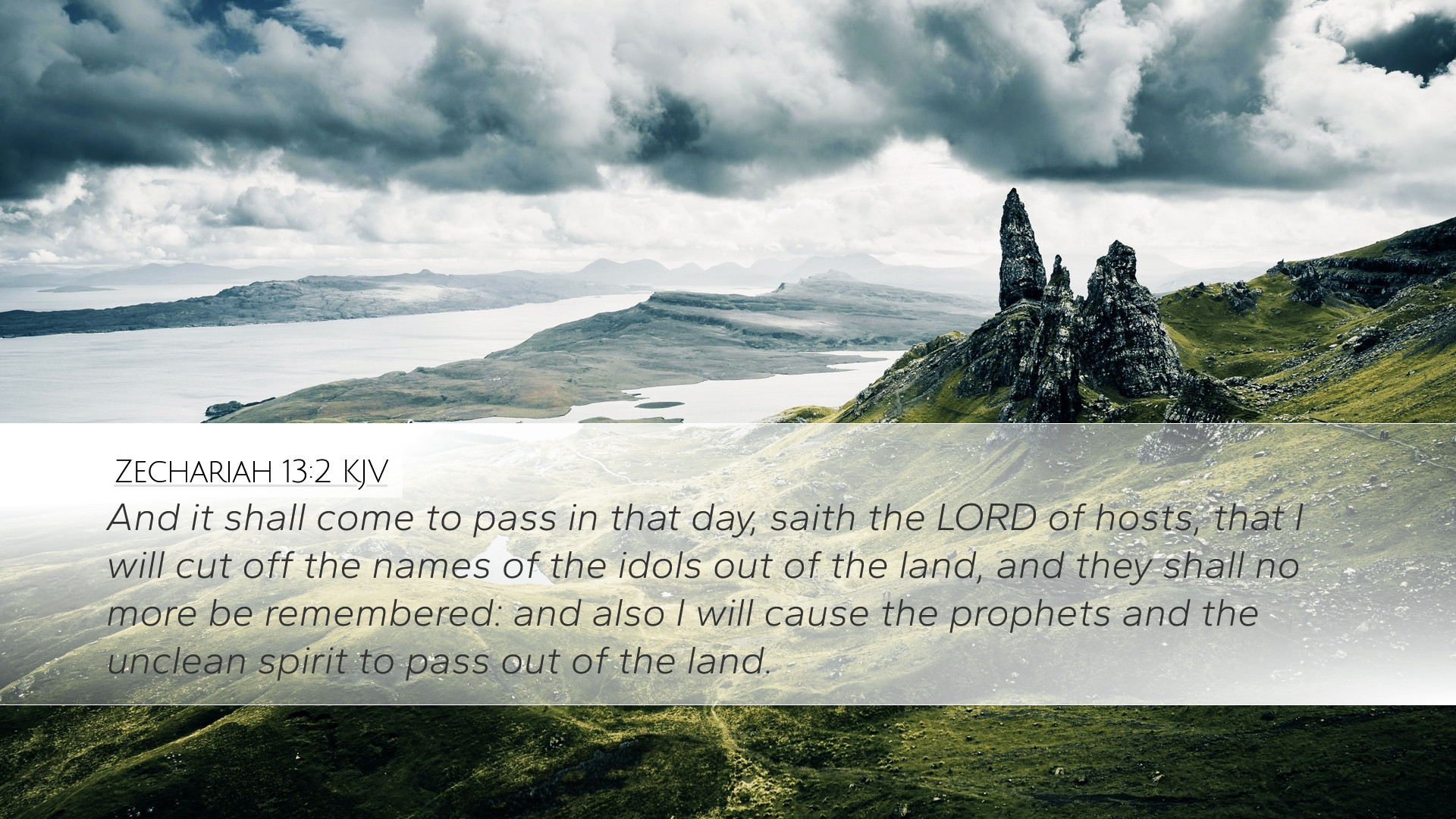Old Testament
Genesis Exodus Leviticus Numbers Deuteronomy Joshua Judges Ruth 1 Samuel 2 Samuel 1 Kings 2 Kings 1 Chronicles 2 Chronicles Ezra Nehemiah Esther Job Psalms Proverbs Ecclesiastes Song of Solomon Isaiah Jeremiah Lamentations Ezekiel Daniel Hosea Joel Amos Obadiah Jonah Micah Nahum Habakkuk Zephaniah Haggai Zechariah MalachiZechariah 13:2
Zechariah 13:2 KJV
And it shall come to pass in that day, saith the LORD of hosts, that I will cut off the names of the idols out of the land, and they shall no more be remembered: and also I will cause the prophets and the unclean spirit to pass out of the land.
Zechariah 13:2 Bible Commentary
Commentary on Zechariah 13:2
Zechariah 13:2 states, "And it shall be in that day," says the Lord of hosts, "that I will cut off the names of the idols from the land, and they shall no longer be remembered. I will also cause the prophets and the unclean spirit to depart from the land." This verse is part of a larger prophetic vision that speaks of the purification and restoration of Israel, with a specific emphasis on the eradication of idolatry and false prophecy.
Thematic Overview
This passage emphasizes God's sovereignty in cleansing His people from the influences of idolatry and falsehood. It highlights two significant areas of concern: the removal of idols and the departure of false prophets. This dual focus is crucial for understanding the holiness that God demands from His covenant people.
Commentary Insights
Matthew Henry's Commentary
Matthew Henry notes that the phrase, "in that day," refers to the eschatological day of the Lord, a future time of intense spiritual upheaval and renewal. He emphasizes that God is determined to cut off the names of idols from the land, signifying the complete removal of idolatrous practices and their memory. These idols were not simply physical objects, but representations of false hopes and misplaced trust, which the Lord is actively eradicating.
Furthermore, Henry points out that the absence of unclean spirits signifies a return to purity and the establishment of a true prophetic voice. The departure of false prophets, those who mislead with falsehoods, stands as a promise of divine truth prevailing. He asserts that the people of God cannot thrive amidst spiritual corruption and that God's intervention is necessary for their restoration.
Albert Barnes' Notes on the Bible
Albert Barnes expands on the prophetic dimensions of this verse, indicating that the cutting off of idols takes place within the context of spiritual renewal and national restoration for Israel. He explains that this act is indicative of God's grace, demonstrating His commitment to purifying His people. The emphasis on remembering idols no longer highlights a complete transformation of the nation’s collective memory and culture, moving away from past sins towards a future of holiness.
Moreover, Barnes elucidates the term "unclean spirit," suggesting that this encompasses all forms of spiritual pollution, including witchcraft and lies. By removing these influences, the promise underscores a societal restoration where truth prevails, allowing for a faithful witness of God’s righteousness.
Adam Clarke's Commentary
Adam Clarke correlates the intentions of God in this passage with both judgment and blessing. He argues that the cutting off of idol names is both judgment on the practices of Israel and a prerequisite for their future blessing. Clarke recognizes that God must first deal with the sins of the people before they can enjoy the full capacity of His grace and favor. The idea of false prophets being expelled indicates the serious nature of misleading those who claim to speak for God.
Clarke also points to how the presence of falsehood can ensnare a community in spiritual blindness. He emphasizes the transformative power of God’s action — that by removing idolatry and falsehood, a new identity in faith will arise for His people, marked by truth and authentic worship. This promise serves both as a warning to those who cling to idolatry and a comfort to those who seek the Lord sincerely.
Theological Implications
The theological implications of Zechariah 13:2 resonate profoundly within ecclesial contexts. The verse speaks not only to the historical situation of Israel but also to the universal church today. Idolatry and the presence of false prophets remain relevant concerns, prompting pastors and theologians to gauge their communities' spiritual health by this standard:
- Idolatry in Contemporary Contexts: Contemporary forms of idolatry can manifest in various forms such as materialism, secularism, or devotion to self. This passage calls for self-examination among believers regarding their allegiances.
- Prophecy and Truth: The need for discernment about prophetic voices today is critical. In an era where many claim to speak on behalf of God, the church is reminded to cling to the truth of Scripture and the authenticity of God's Word.
- Community Purification: Just as God promised to cleanse the land of idols and falsehood, the church is called to pursue collective purity. This involves confronting untruths and fostering an environment where the Holy Spirit can work freely.
Conclusion
In conclusion, Zechariah 13:2 is a powerful declaration of God's intent to restore and purify His people. The insights from public domain commentaries reveal the depth of God's commitment to His holiness and the necessity of His intervention in the lives of believers. As the church navigates the complexities of modern spiritual challenges, this verse serves as both a warning and a promise, urging a return to true worship and sanctified living. It emphasizes that the removal of unclean influences paves the way for a thriving community rooted in the truth of God's Word.


